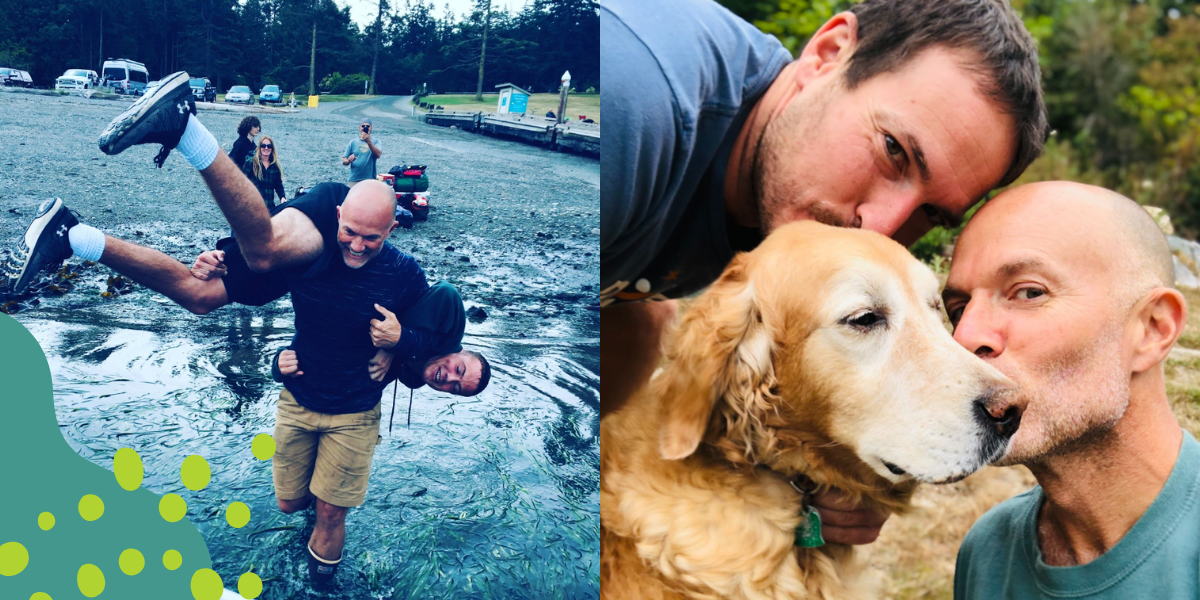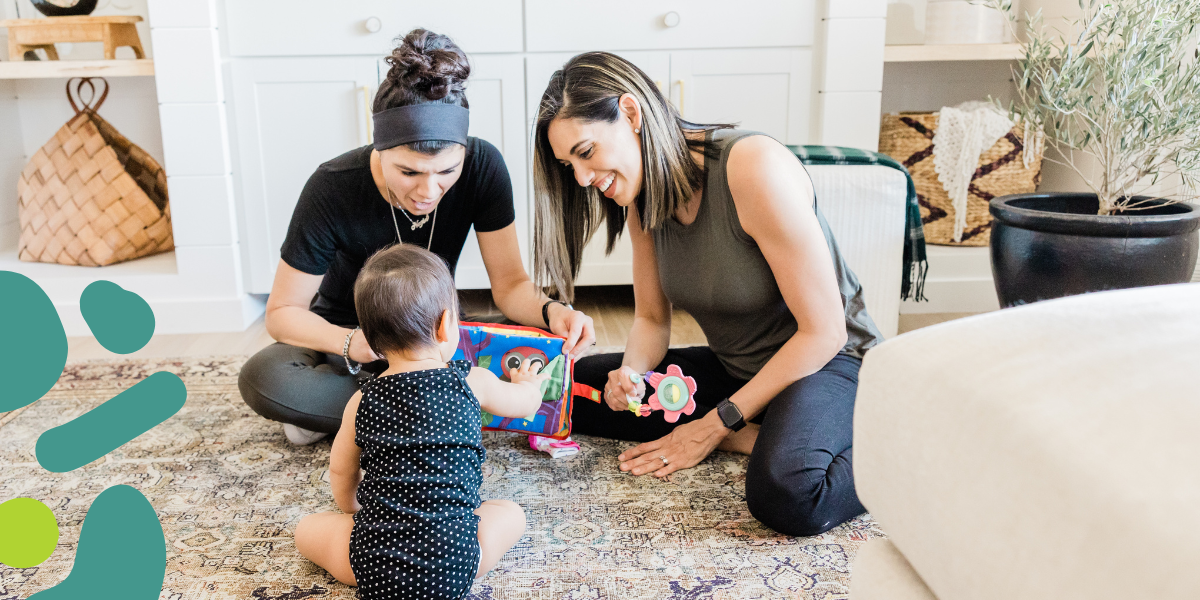
LGBTQ+ Guide to Private Infant Adoption: The Pre-Placement Stage
June 14, 2023
Hi! I’m Bo, and I’m a Director at PairTree. There is a special place in my heart for people and families like yours. I’ve worked with dozens of LGBTQ+ folks on their adoption journey since I joined PairTree.
I’d love to share what I’ve learned to be most useful – and hopefully, this can serve as a guide for your family-building journey.
Step One: Is Parenting Right for You?
Deciding to build a family with children is already a huge decision.
Several years ago, my boyfriend and I assessed the possibility of fostering, but ultimately chose not to move forward. Going through the process, though, highlighted the complexity, hope, and fear that exists in the “parent or guncle” decision. We ultimately decided to take the “fur baby” path, which seemed like a better fit for us. Because of my experience both in this decision and working at PairTree, I have some insight into what factors you may be weighing.

As a PairTree employee, I’ve also had the joy and opportunity to talk with so many hopeful adoptive parents. I’ve noticed many of our gay and lesbian families say things like…”I’ve just always wanted to be a parent,” or, “...I’ve just always wanted to adopt…”
While surrogacy remains the most popular path to parenthood for LGBTQ+ folks, the percent choosing adoption is definitely on the rise. Choosing adoption is a very deliberate choice.
Step Two: Is Adoption Right for You?
As LGBTQ+ parents, you’ll likely face prejudice in your decision to become parents. But, did you know children raised by gay parents fare just as well, if not better than, those raised by straight parents?
I really like this NYT article if you’re still contemplating if adoption is right for you (see ‘Know your reasons for adopting — and accept your limits' section). Also, I would immerse yourself in some of the adoption language and acronyms to help you get started.
Once you’ve decided to move forward with adoption, your next step is to contemplate which path you should take.
Step Three: Which Adoption Path is Right for You?
There are several different adoption paths to consider, such as: public vs. private, domestic vs. international, in addition to a number of preferences (such as age of child, openness to special needs, transracial, etc.) that you need to thoroughly evaluate. All of these factors influence which path is right for you. Creating a Family does a great job of comparing the implications of the different paths available.
- Note: ‘public’ means adopting through the foster care system, while ‘private’ means working with an expectant mom exclusively
Regardless of the path you take, I recommend having the most choice and control over your process.
How Much Does It Cost to Adopt?
In addition to the above, other factors to consider relate to cost and effort. For those pursuing private adoption, PairTree strives to make the total cost of adoption between $15,000-$20,000 (while the average cost of private infant adoption in the US is around $45K-65K).
It’s a big range, and it’s a good idea to figure out how much you can comfortably afford knowing that your child will ask you the circumstances of the adoption, including how much you spent. In order to feel comfortable with your answer, it’s important to be honest with yourself when weighing the options.
Managing your adoption journey is like taking on a part-time job. So, consider how much time you have to invest in this process, as well. And, if you plan to adopt with a partner, you may also consider who will be “chef” and who will be “sous chef” in this process – it’s often useful to have one person take the lead.
At PairTree, we advise people to spend the least amount possible for as long as possible because the longer you wait, the wider you’ll want to go with outreach (and going wider usually has a price associated with it). If you’ve spent all your money out the gate, you’re stuck.
- If you have a financial advisor, we recommend getting their input.
- You can also apply for grants.
- Some employers offer “infertility benefits” or “family-building benefits” and sometimes adoption costs are included. (If your employer doesn’t, we'd be happy to talk to your HR team about this!)
- PairTree fees qualify for the Federal Tax Credit, a huge benefit for adopting families. For adoptions finalized in 2023, there is a federal adoption tax credit of up to $15,950 per child! Learn more here.
Hot tip: Most child placing agencies have lower fees for something called “identified adoption.” That means when adopting families and an expectant mom have already connected with one another, and are now asking the agency to walk them through the next steps. Instead of paying an expensive agency fee, adopting families are typically asked to pay much less.
At this point, you should have a directional sense of which path to adoption is right for you. Take yourselves out for dinner and celebrate this accomplishment. It’s a big deal and important to celebrate the “easy” wins.

Step Four: Build Your Adoption Team
To begin, know that adoption laws vary by state. It’s smart to familiarize yourself with the adoption laws in your state. And, if you end up adopting a child from a different state than yours, you’ll want to be familiar with both states’ laws. (Note: this is called interstate adoption, and it’s the most common kind of private adoption.)
- Some states require that you use a licensed child-placing agency to facilitate an adoption, while other states only require that you work with an attorney.
- There is also a federal law called “ICPC,” which stands for “Interstate Compact on the Placement of Children,” which includes all the regulations and requirements for interstate adoption.
- You don’t need to know all the intricacies of adoption law, but you do need team members on your side to help guide you.
With regard to adoption law, I recommend contacting a AAAA attorney in your state. These attorneys specialize in adoption - plus, you will eventually need an attorney to finalize your adoption so it’s best to start fostering a relationship with an attorney early in the process.
Are There LGBTQ-friendly Adoption Agencies and Consultants?
Yes! I’d also recommend finding an LGBTQ+-friendly adoption agency in your state – and schedule an appointment with them. It’s always a good idea to learn from adoption agencies in your area about:
- Recent adoption trends
- How they specifically advise LGBTQ+ folks
- How they operate, and the processes they follow
- How they treat expectant moms and birth families
But fair warning – not all agencies are created equal.
Check for evidence of placements with LGBTQ+ families, and examples of waiting families that identify as LGBTQ+. Discrimination is still common in the adoption industry. Consider giving your contact information to the agency, and see if they can connect you with other LGBTQ+ waiting families.
How Do I Determine if an Adoption Agency is Ethical?
There are also some adoption professionals that operate in super shady ways. Here are some questions you should ask to ensure they’re working in a way that resonates with you:
- How do expectant moms find your agency? What support does your agency offer the birth family post-placement?
- It’s worth noting that expectant moms & birth families are treated borderline negligent in this country. (We’re working hard to fix that!) Learn about the expectant mom journey here.
- What is the current ratio of expectant moms to waiting adoptive families (and how does that compare)?
- What is the average wait period for your LGBTQ+ families? How does it compare to straight couples/individuals?
- What are the total costs of working with your agency, and what is specifically included?
Collect as much information as you can, and let it simmer for a couple weeks. Agencies tend to specialize in fine print and there are often lots of hidden costs. Remember, this is a lifelong decision and your “team” is essential to helping you realize a healthy adoption (which means you’ll receive support for years after the placement).

How Can I Self-Navigate the Adoption Process?
PairTree shows you how! We’re an adoption enablement platform that partners with agencies and adoption professionals nationwide to provide all the services and resources necessary to healthily navigate the private adoption process. PairTree also makes it possible for you to connect directly with expectant moms and adoption professionals on your own, granting you more choice and control. Here are the 3 questions you should ask yourself to see if this approach is right for you.
We are happy to provide a free consultation about PairTree. Feel free to schedule time with me, or reach out to hello@pairtreefamily.com. There are 3 adoptive parents at PairTree and one 2x birth mom, and we’re all ready to share our perspectives. Plus, we typically see about 20% of the adopting families on PairTree identify as LGBTQ+, and we are more than happy to make introductions.
Some families are also able to leverage multiple adoption professionals (PairTree + agency or adoption consultant) in a “hybrid” approach. If you can afford it, we think this is a great path! We work with everyone (whom we consider ethical - definitely ask us about that), and advise that you spend as little money as possible to get the most opportunity.
Other team members you might consider:
- A medical professional (who can inform you about the medical implications of drug & alcohol exposure - if relevant, or any other questions you may have)
- A family therapist who specializes in adoption. Trust me, you will eventually need support from a trained professional, and it’s best to find someone who understands the adoption experience from mutual perspectives.
- Lock-down your list of “go-to” friends and family members who can be your support system while you go through this process – this is a great opportunity to practice leaning on them for support.
Hot tip: Chemistry really matters in this process! When you work with an adoption professional, make sure you “vibe.” This is a lifelong relationship, so it’s important that you feel safe and connected to this person. Especially when it comes to your home study provider!
Step Five: Get Home Study Approved
Now that you have decided on an approach, and have your initial team in place…it’s time to start working on your home study. Although it is the fifth step in this guide, it is the first major step toward your adoption.
What Should I Expect During the Home Study Process?
A home study is a thorough assessment of your readiness to bring a child into your home. The home study process varies by state, but all include:
- a comprehensive background check
- financial assessment
- referrals
- education
- autobiographical details
- at least one home visit
The home study process is also when you answer some very important questions. For example:
- Am I open to special needs?
- Am I open to drug/alcohol exposure during pregnancy?
- What degree of “openness” do I want with the birth family?
- Am I open to a trans-racial adoption?
As you think about your answers to these questions, strongly consider “why” and “what’s underneath” your view? At PairTree, all of our families get free, unlimited education via our partnership with Creating a Family. This is a great resource to guide your decision-making around the questions above.
For example, countless studies (and our personal experiences at PairTree) continuously show that healthy open adoption relationships are better for adoptees. There is no rational reason to fear the birth family. In fact, for the love of your child, you will want them to have a healthy relationship with their birth family!
Similarly, if you answer “yes” to trans-racial adoption…read this book. There are countless, life-long implications to this decision and it’s best to be fully aware & prepared. In addition to this book, discuss the implications of transracial adoption with transracial adoptees, as well as your team of adoption professionals.
I think it’s best to think of home study as a bonding exercise for you and your partner (if relevant). There are lots of important questions to discuss and answer (so you really get to learn more about each other), you get to choose a home study provider (who will be your mentor and advocate for the entirety of your adoption journey – arguably the important relationship on your team), and you get to feel a strong sense of reward by completing this extensive assessment of your life.
The process can take anywhere from a couple weeks to several months – give yourself time and permission to do it right (and consider giving yourself a target due date, if that helps you).
At PairTree, we connect you with a licensed home study provider (that we know and love) who will use our modern/online Home Base platform to complete your home study in the most efficient, transparent, and secure manner possible. Watch our videos – they are really helpful.
Any questions, reach out at homestudy@pairtreefamiily.com.
Just like agencies, not all home study processes and providers are created equal.
Also, don’t stress about the home visit. In fact, read this article to get even more prepared for the home study process.

Step Six: Build Your Profile
Once you complete the home study and are approved, you can build an online profile on PairTree’s Connect platform, and start connecting with expectant moms. Exciting!
Your profile needs to be the most painfully authentic version of yourself possible. In our internal research, we found that expectant moms most used filters are personality and open to…(“special needs” or “older children”) – that’s not to say those are the only dimensions that matter, but it’s important to realize that the expectant mom is the one in charge – it’s her choice and her timeline.
Here is some guidance that we offer for the profile building process.
In the event an expectant mom contacts you, it’s important to take a few breaths. We provide lots of safe connection tips, and you can always touch base with PairTree or your home study provider for guidance. If your internal alarms go off (for whatever reason), listen to that and seek guidance.
At PairTree, we constantly monitor connections, and notify families immediately if an expectant mom flags one of the three markers we track. Scams occur across the adoption industry and you need to protect yourself.

Step Seven: Practice Patience
One of the hardest aspects of adoption is the time period called “waiting,” and it’s named that for a reason.
Patience is absolutely critical. Many families wait months…even years…but you have to trust the process and believe that your baby is going to eventually find you. I don’t mean to sound “woo” about it – I truly believe that.
So, during the time of waiting, you can create a profile book, launch an adoption website, send emails to your network asking for their help in finding an expectant mom. Plus, you need to take care of yourselves. Of course you can (and should) read books about adoption, but you should also enjoy trashy beach reads, hit the gym, make healthy meals, and spend quality time with your people.
Waiting is hard. Definitely reach out to your community to support you during this often difficult time period. Or, come to PairTree and join one of our community groups!
At some point, if you reach a mutually-agreeable “match,” each of you will need separate legal representation. Remember that PairTree can guide you to a AAAA attorney or agency in your State (depending on the laws), and they can help you through finalization.
I hope this is useful! If you have any questions or feedback, please feel free to contact me at bo@pairtreefamily.com. I love helping our LGBTQ+ families on their adoption journey, and I’m a resource to you anytime you need it!
Thanks!
Bo


